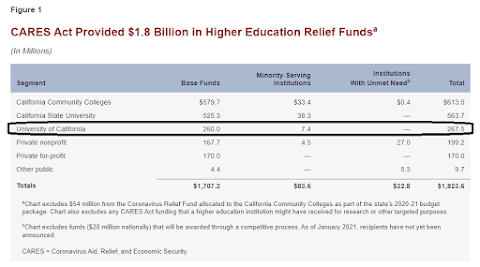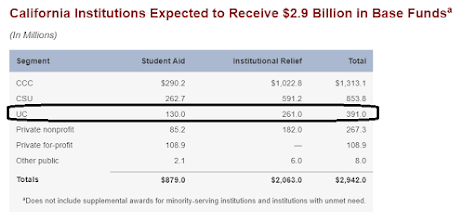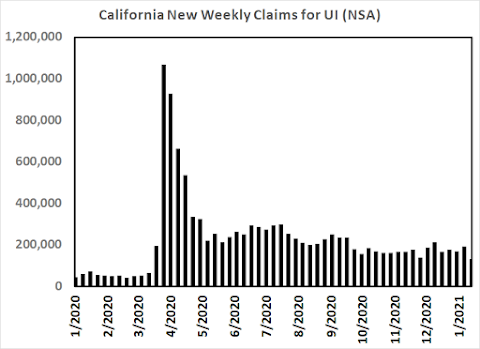In the past when we have indefinitely archived Regents meetings, we have only offered the choice of listening. We now unveil an additional choice: You can watch (or listen) at the links below:
Yours truly is teaching this quarter so he has been archiving but not watching or listening. When time is available, he will see if anything happened that the Daily Cal didn't pick up in its description of the Tuesday (Jan. 19) session. But for now:
====
BY JASMINE LEE, LAUREN GOOD AND NATALIE LU, 1-20-21
At its first virtual meeting of 2021, the UC Board of Regents approved funding for a technology fellowship pilot program, discussed telehealth developments and listened to concerns regarding racial discrimination. The National Laboratories Committee approved a proposal to fund $200,000 to establish a pilot program for a postdoctoral fellowship in technology and international security. Craig Leasure, vice president of UC National Laboratories, said the pilot program would use funds from the Capital and Campus Opportunity Fund. The fellowships would be for those at Los Alamos National Laboratory, Lawrence Livermore National Laboratory — an offshoot of the Lawrence Berkeley National Laboratory — and the Institute on Global Conflict and Cooperation at UC San Diego. The fellowship program would also bring benefits, according to Leasure, such as developing collaborations between campuses and labs, in addition to creating opportunities for students interested in national security and other social sciences.
Leasure said the program would also come with the impact of “building intellectual capacity across the UC system in the nexus between science, technology, nuclear and international security issues.”
During the public comment portion of the board meeting, former UCSD health employee Tamara Totten said she was laid off by UCSD Health alongside another Black coworker. She reflected on her experience at UCSD Health, alleging that out of the 32 member unit, the only two employees who were laid off were Black women.
“I endured harassment, threats, criticism and isolation, and rather than getting relief, I was served with a layoff notice a month later,” Totten alleged. “This happened even though we have more seniority. UCSD chose to hire and keep a non-African American contract employee and assigned her to my work after I was laid off.”
Two other main concerns raised during the public comment session were the UCSF Medical Center expansion plan and animal agriculture cruelty within the UC system. San Francisco resident Robert Goodman urged the regents to consider deferring UCSF’s expansion plans. On the other hand, San Francisco Building and Construction Trades Council secretary-treasurer Rudy Gonzalez voiced support for the construction of UCSF medical buildings.
The Health Services Committee presented a UC health update on telehealth innovations, which entails health care services that are provided electronically. According to Lawrence Friedman, associate dean of clinical affairs at UCSD Health, the UC health system has “become an industry leader,” publishing more than 40 articles on COVID-19 telehealth. More than 7,000 providers and staff have been trained on telehealth across the UC system, and 11 languages and interpreter services are offered within telehealth, according to Friedman. Through telehealth, services such as clinical consultations, virtual family visits for COVID-19 patients and physical therapy group sessions are offered to inpatients. Across all campuses, ambulatory patient visits were almost all in person until March 2020, and by April, nearly half of the visits were through telehealth, according to Friedman. Currently, about 20% to 25% of ambulatory visits are via telehealth, which Friedman said he expects will continue past the COVID-19 pandemic, as he noted that both patients and providers find telehealth visits “convenient” and “efficient.”
“Telemedicine is here to stay, but many of our students would benefit from resuming in-person activities,” said Brad Buchman, chief medical officer of UC Health’s student health and counseling.
According to Buchman, telehealth mental health visits outnumbered other medical visits in a three-to-one ratio. Anxiety was the top mental health concern for those who use telehealth services, followed by depression.
UC Santa Cruz, UC Santa Barbara, UC Irvine and UCSF have been chosen as pilot virtual care clinics for the UC Virtual Care Collaborative for student mental health due to their readiness and willingness to participate, according to Friedman.
“This is the wave of the future,” said Regent Sherry Lansing. “This is one of the good things that has come out of this crisis — the benefits of telemedicine and telehealth.”
Source: https://www.dailycal.org/2021/01/20/uc-regents-approve-funding-technology-fellowship-pilot-program/
Links to the sessions are below at:
https://archive.org/details/board-health-natl-labs-1-19-21
Board, Health, National Labs at:
https://archive.org/details/board-health-natl-labs-1-19-21/board%2C+health%2C+natl+labs+1-19-21.mp4
Governance at:
https://archive.org/details/board-health-natl-labs-1-19-21/Governance+Committee+1-19-21.mp4


























